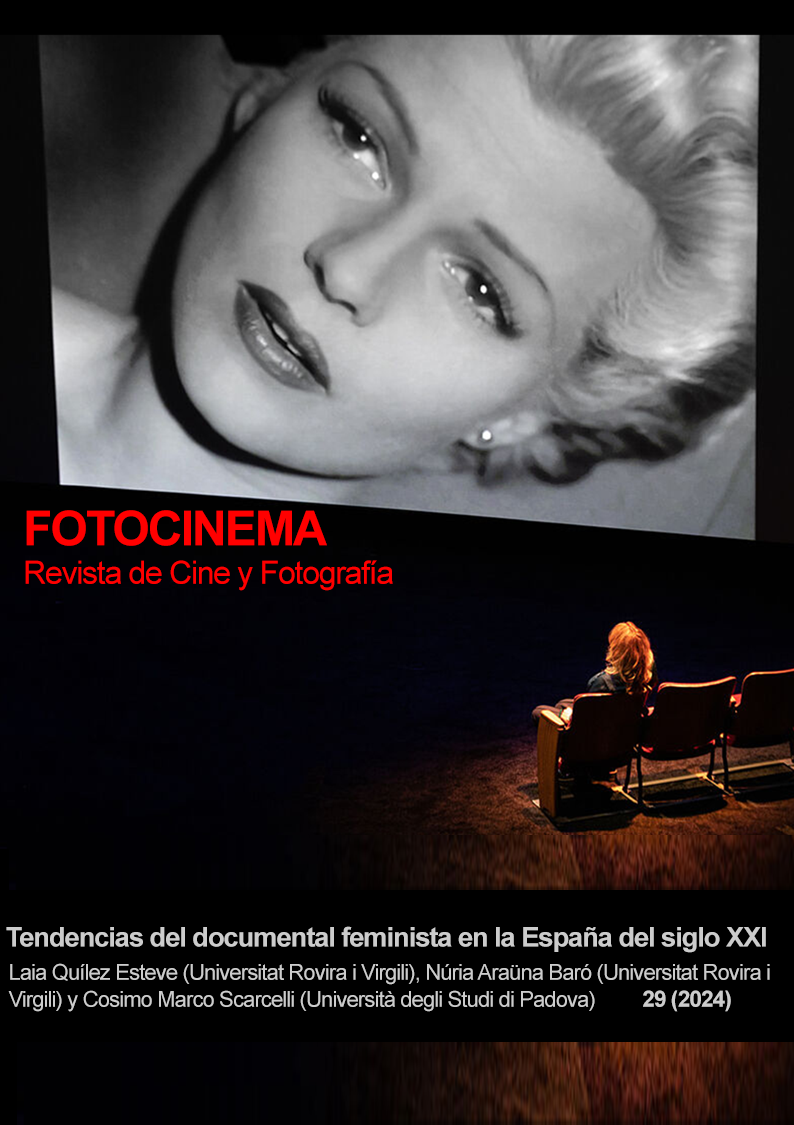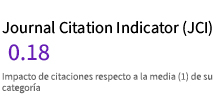“The future belongs to women because the past belongs to men”. The recovery of Nadia Werba's cinema in Spain (1965-1967)
DOI:
https://doi.org/10.24310/fotocinema.29.2024.19575Keywords:
Nadia Werba, Documentary, Women filmmakers in Spain, Archive, Film restorationAbstract
The painter and filmmaker Nadia Werba, who settled in Italy long time ago but lived in Madrid for about ten years from 1956 onwards, made four short documentaries in the 1960s with a very particular observational style: San Juan del Toro (1965), Maestros del duende (1966), Unos chicos, unas chicas (1966) and Catch (1967). In addition to their cinematographic value, these works are interesting as sociological portraits, since they show different aspects of Spain at the time, from the bullfighting world to the “ye-ye” fashion or wrestling shows. As part of the current interest of feminist film studies in the memory of forgotten female directors, this text aims to recover the figure of Werba and especially her production of documentaries during her period in Spain. For this purpose, we will use archival work, but especially we will document the restoration processes that have been carried out in Filmoteca Española from the film materials attributed to the director and available in their collections.
Downloads
Metrics
Publication Facts
Reviewer profiles N/A
Author statements
Indexed in
-
—
- Academic society
- N/A
- Publisher
- Universidad de Málaga
References
Acland, C. R. y Wasson H. (Eds.). (2011). Useful Cinema. Duke University Press.
Barad, K. (2003). Posthumanist Performativity: Toward an Understanding of How Matter Comes to Matter. Gender and Science: New Issues, 28 (3), 801-831. https://doi.org/10.1086/345321
Camí-Vela, M. (2005). Mujeres detrás de la cámara: entrevistas con cineastas españolas 1990-2004. Ocho y Medio.
Canovas Belchí, J. y Castro Muñiz, M. (2006). Rosina Prado Fernández. Directora del cine documental. En J. Pérez Perucha y P. Poyato (Coords.), XI Congreso Internacional de la Asociación Española de Historiadores del Cine. !Savia nutricia? El lugar del realismo en el Cine Español (pp. 60-67). Filmoteca de Andalucía, Consejería de Cultura.
Caparrós Masegosa, L. (2019). Instituciones artísticas del franquismo. Las exposiciones nacionales de Bellas Artes (1941-1968). Prensas Universitarias de Zaragoza.
Cerdán, J. y Fernández Labayen, M. (2022). Cine, migración y archivos. L’Atalante. Revista de estudios cinematográficos, 34, 7-17. https://www.revistaatalante.com/index.php/atalante/article/view/1030
Combarros Peláez, C. (2005). 50 años de la Semana Internacional de Cine de Valladolid (1956-2005). Una ventana al mundo. Ayuntamiento de Valladolid.
Cordero-Hoyo, E. (2019). El salto del espectáculo de variedades a la dirección cinematográfica en el cine mudo: El caso de Helena Cortesina en España. En À. Quintana y J. Pons (Eds.), 11° seminario internacional sobre los antecedentes y orígenes del cine: Presencias y representaciones de la mujer en los primeros años del cine 1895–1920 (pp. 131–142). Fundació Museu del Cinema.
Coronado Ruiz, C. (2022). Más mujeres en el cine: CIMA y su trabajo en positivo para cambiar lo negativo. Área Abierta, 22(2). https://doi.org/10.5209/arab.79078
Filmoteca Española. (2020). 90 años de Elena Espejo. Flores en la Sombra, 26 de junio a 3 de julio de 2020. https://www.cultura.gob.es/dam/jcr:c79d3095-07d3-4b4c-9f33-ca910dc3c246/el-dor--en-casa---90-a-os-de-elena-espejo.pdf
Filmoteca Española. (2020). Homenaje a Rosa G. Salgado. Flores en la Sombra, 6 al 13 de noviembre de 2020. https://www.cultura.gob.es/dam/jcr:6d8d05bd-78e4-4470-93f6-c64023c568ca/flores-la-sombra---homenaje-a-rosa-g--salgado.pdf
García de Dueñas, J. (2000). El imperio Bronston. El Imán.
García López, S. (2016). El cuerpo y la voz de Margarita Alexandre. Cuadernos Tecmerin, Universidad Carlos III de Madrid.
García López, S. (2021). Miradas invisibles: mujeres en la Escuela Oficial de Cinematografía (1947–1976). Journal of Spanish Cultural Studies, 22, 311-329. https://doi.org/10.1080/14636204.2021.1960697
Hediger, V., Hoof, F. y Zimmermann, Y. (2023) Films that Work Harder. The Circulation of Industrial Film. Amsterdam University Press.
Marsh, S. (2013). Ana Mariscal: Signature, Event, Context. En P. Nair y J. D. Gutiérrez Albilla (Eds.), Hispanic and Lusophone Women Filmmakers (pp. 72–82). Manchester University Press.
Martínez Tejedor, M.C. (2016). Directoras: pioneras del cine español: de los años veinte a los años sesenta. Fundación Best Team.
Medina, P., González, L. M. y Martín Vázquez, J. (Eds.). (1996). Historia del cortometraje español. Festival de Cine de Alcalá de Henares.
Melero, A. (2013). Rosario Pi and the Challenge of Social and Cinematic Conventions during the Second Republic. En P. Nair y J. D. Gutiérrez Albilla (Eds.), Hispanic and Lusophone Women Filmmakers (pp. 83–95). Manchester University Press.
París, I. (2015). Epílogo. Un mañana para volar. En F. Zurián (Ed.), Construyendo una mirada propia. Mujeres directoras en el cine español: de los orígenes al año 2000 (pp. 303-310). Síntesis.
Moreno Galván, J. M. (1960). Discriminación apresurada de la abstracción en España. En J. P. Llorente (Ed.) (2005), Historia de la crítica de arte. Textos escogidos y comentados (pp. 451-460). Prensas Universitarias de Zaragoza.
Riambau, E. y Torreiro, C. (2008). Productores en el cine español: Estado, dependencias y mercado. Cátedra.
Ruiz del Olmo, F. J. y Hernández-Carrillo, C. (2021). La presencia de la mujer en los filmes galardonados a lo largo de las 20 ediciones del Festival de Málaga de Cine en Español. Cuadernos Pagu, 62. https://doi.org/10.1590/18094449202100620012
Selva i Masoliver, M. y Solà i Arguimbau, A. (2023). Feminismos y cineastas en el documental español. En C. Torreiro y A. Alvarado (Eds.), El documental en España. Historia, estética e identidad (pp. 290-304). Cátedra.
Tranche, R. (1996). El cortometraje durante el franquismo. En P. Medina, L. M. González y J. M. Velázquez (Eds.), Historia del cortometraje español (pp. 79-100). Festival de Cine de Alcalá de Henares.
Vonderau, P. y Hediger, V. (2009). Films that Work: Industrial Film and the Productivity of Media. Amsterdam University Press.
Zecchi, B. (2014). Desenfocadas: cineastas españolas y discursos de género. Icaria Editorial.
Zecchi, B. (2015). Margarita Aleixandre: una pionera bajo el signo de la excepcionalidad. En F. Zurián (Ed.), Construyendo una mirada propia. Mujeres directoras en el cine español: de los orígenes al año 2000 (pp. 29-48). Síntesis.
Zurián, F. (Ed.). (2015). Construyendo una mirada propia. Mujeres directoras en el cine español: de los orígenes al año 2000. Síntesis.
Downloads
Published
How to Cite
Issue
Section
License
Copyright (c) 2024 Josetxo Cerdán, Lucía Rodríguez García de Herreros

This work is licensed under a Creative Commons Attribution-NonCommercial-NoDerivatives 4.0 International License.
All contents published in Fotocinema Revista científica de cine y fotografía are protected under the Creative Commons Attribution-NonCommercial-ShareAlike 4.0 International (CC BY-NC-SA 4.0) license. All about this license is available in the following link: <http://creativecommons.org/licenses/by-nc-sa/4.0>
Users can copy, use, redistribute, share and exhibit publicly as long as:
- The original source and authorship of the material are cited (Journal, Publisher and URL of the work).
- It is not used for comercial purposes.
- The existence of the license and its especifications are mentioned.
There are two sets of authors’ rights: moral and property rights. Moral rights are perpetual prerogatives, unrenounceable, not-transferable, unalienable, imprescriptible and inembargable. According to authors’ rights legislation, Fotocinema. Revista científica de cine y fotografía recognizes and respects authors moral rights, as well as the ownership of property rights, which will be transferred to University of Malaga in open access. The property rights are referred to the benefits that are gained by the use or the dissemination of works. Fotocinema. Revista científica de cine y fotografía is published in an open access form and it is exclusively licenced by any means for doing or authorising distribution, dissemination, reproduction, , adaptation, translation or arrangement of works.
Authors are responsable for obtaining the necessary permission to use copyrighted images.














13.png)



